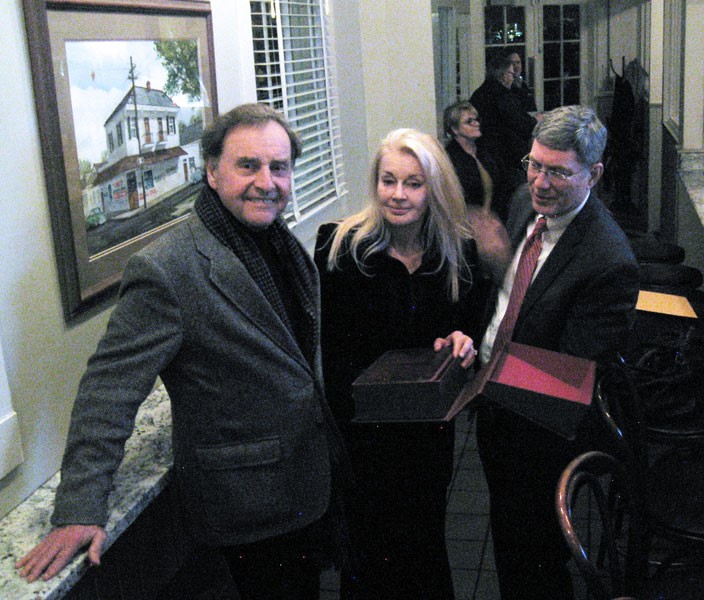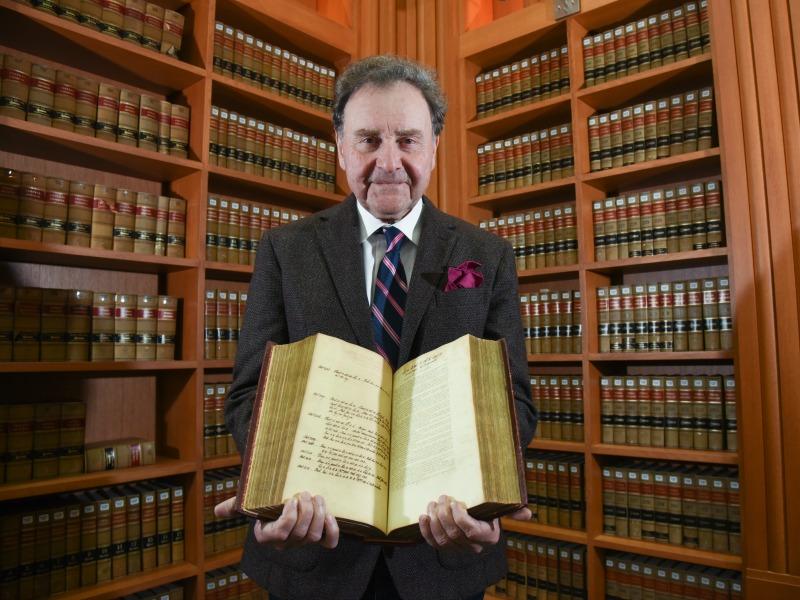'Fabled' 200-year-old manuscript gifted to Tulane Law School
The most fabled book in Louisiana legal history – the de la Vergne volume -- has been gifted to Tulane Law School, an original founding document that details not only the laws of the 1808 Louisiana territory but also contains the hand-written notes of its principal codifier.
The manuscript, a thick red-leather-bound, gold-embossed volume is more than two centuries old.
It is written in both French and English, with hand-written notes on interleaved pages by Louis Moreau Lislet, the man tasked in 1808 with codifying the laws of the new Louisiana territory.
It is the stuff of legal lore, causing more controversy among academics and scholars than any other book in the state’s history, particularly on the question whether the civil code originated from French or Spanish laws.
“This is perhaps the most debated document in Louisiana law -- and the most intriguing,” said Tulane Law Professor Vernon Palmer, who has extensively researched the volume and whose scholarship was notable in bringing the book to Tulane.
Louis de la Vergne, a lifelong friend and a classmate of Palmer’s, graduated from Tulane Law in 1965. He made the study of the volume his life’s mission, along with his ancestors’ contributions to the establishment of Louisiana’s civil law. De la Vergne came from a long line of legal scholars who contributed to the early foundations of Louisiana, and one of his ancestors is credited with establishing the predecessor to Tulane Law School.
When de la Vergne died in 2017, he bequeathed the book to his close friend, Anna Swadling. In January, Swadling traveled from Santa Fe to New Orleans. Here, she met with her attorney, Kevin O'Bryon (L'81), and Palmer to present the volume to Tulane.

Volume.
“It was in Louis de la Vergne's family for generations. It created its own legend and inspired a prodigious literature,” Palmer said. “And it’s not at all over. I’m certain the debate will continue.”
The book will be housed among Tulane Law School’s rare book collection; how it will be displayed is still under consideration, said Professor James E. Duggan, Director of the Tulane Law School Library.
“We are extremely fortunate to have acquired this landmark volume at Tulane,” said Duggan, who added that the book “was donated in memory of Louis de la Vergne and in honor of Vernon Palmer.”
The law school’s ties to the volume go back decades. In 1938, Pierre de la Vergne (Louis’ uncle) told law Professor Ferdinand Stone that his family had the volume with Moreau Lislet’s personal notes.
In 1941, Professor Mitchell Franklin published an article making the world aware that the de la Vergne family had “an unpublished manuscript in which Moreau Lislet gave, in detail, the exact sources for the various articles of the Louisiana Civil Code of 1808.”
By the mid-60s, the volume created a roaring debate between two academics, Louisiana State University Professor Robert Pascal and Tulane Law Professor Rodolfo Batiza. Pascal argued the volume really reflected a digest of Spanish law in force in Louisiana in 1808; however, it may have looked to be French.
Batiza responded with meticulous research; he undertook an extensive study of the manuscript, showing the majority of provisions had been taken directly from French law, as compared with the relatively few taken from Spanish sources. The debate raged throughout the 70s, and to this day remains a source of disagreement among scholars.
In 2003, Palmer studied the volume and concluded that some 30 percent of the articles are left blank and have no reference in the manuscript. But once researched, most could be traced back to French law.
It is a marvelous debate, and fitting that the de la Vergne came home, said Professor Ron Scalise, who has been involved in editing the Louisiana Civil Code for years and is the current edition’s editor.
“Scholars from Tulane Law School have been at the forefront of research on the de la Vergne manuscript and at the center of the debate from the very beginning,” said Scalise, a civil law scholar and expert. “The gift of the de la Vergne volume to Tulane helps ensure that that tradition and continued research on this important work will continue for many years to come.”
|
|
||
|
|
|
|

